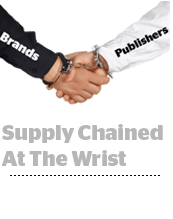 A slew of consortiums, collaborations and integrations have emerged to fill the need for a universal advertising ID, which would help publishers and ad tech companies level the playing field with Google, Facebook, Amazon and other platforms with vast logged-in user data.
A slew of consortiums, collaborations and integrations have emerged to fill the need for a universal advertising ID, which would help publishers and ad tech companies level the playing field with Google, Facebook, Amazon and other platforms with vast logged-in user data.
But those vendor-focused initiatives struggled to gain broad adoption and overcome competitive issues between ad tech companies. Now some brands and publishers hope that by narrowing the collaborative ID’s scope to measurement, they can bypass the challenges faced by similar efforts for audience targeting.
“The collaborative persistent ID efforts are generally about audience targeting,” said Trace Rutland, Tyson Foods’ director of media innovation. “But keeping the focus on measurement reduces the tension between consumers, who want privacy, and brands and publishers, which want to attribute campaigns that have already run.”
Rutland is an advisor to Truth in Measurement, a project that launched last week by the ad server startup Thunder Experience Cloud. It aims to standardize contractual agreements between advertisers and publishers for sharing IDs and cookies for campaign measurement.
Truth in Measurement is more project than product right now, said Vinny Rinaldi, Hershey’s head of addressable media and technology who is also serving as a brand advisor for the initiative.
All industry identity initiatives share “pie in the sky conversations,” Rinaldi said, but unlike the vendor consortiums, Truth in Measurement’s goal better aligns with publishers and direct brands. Publishers, for instance, don’t want brands to tag their sites or their cookies to be co-mingled so that advertisers can identify their audiences elsewhere. But Rinaldi said publishers want to improve measurement, since that shows the value of their inventory.
A shared cookie-based ID used exclusively for campaign attribution, not for real-time targeting or audience profiling, bridges the key stakeholders of brands and publishers, said Victor Wong, Thunder’s co-founder and CEO. The idea resembles Facebook’s 2018 policy change that suspended third-party data for targeting but allowed tracking for attribution, he said.
The programmatic consultancy Labmatik is helping to develop the framework. And to fill out supply and ad tech, the group is working with a few large media and advertising platforms, including Hulu, Roku, Meredith and Xandr, which also sits on the advisory board.
Universal cookie consortiums and identity tactics have long been the domain of ad tech vendors, but as large brands add expertise and learn from direct-to-consumer startups, they’ll bring fresh legs to the effort, Rinaldi said. “At CES I was surprised that so many conversations with brand marketers were about these common themes of data-savvy practices in the mar tech ecosystem.”
Rutland said brands need to be more invested in topics that have to date been owned by ad tech, because brands can compel vendors to change more effectively than vendors can self-organize around a standard. Consumers also hold brands accountable for digital media practices, even those they may not even be aware of.
“Whatever happens the consumer holds the brand responsible,” she said. “Anything that hits the press or trespasses on consumer privacy isn’t your ad server or DSP – it’s the brand that screwed up.”
This post was syndicated from Ad Exchanger.


More Stories
The Tuesday Club hosts Women’s Work’s In(visible) exhibition in Tāmaki Makaurau
Under Armour Taps Estée Lauder Exec to Lead AI and Analytics
Lani Jamieson joins D3 to shape the next chapter of its growth